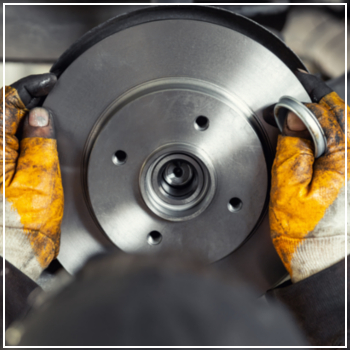 Drivers may neglect brake maintenance until they notice something wrong, like the car takes longer to stop or the brakes grind. In terms of vehicle safety, brakes are one of the most essential components.
Drivers may neglect brake maintenance until they notice something wrong, like the car takes longer to stop or the brakes grind. In terms of vehicle safety, brakes are one of the most essential components.
The brake system consists of the rotors, which are situated behind each wheel, and the caliper, which places pressure on the rotors when you apply the brakes. This action causes the wheels to slow down, so the car can fully stop.
A key point of contact, the brake pads receive a significant amount of wear and should be changed once their thickness wears down to 3mm or less. Throughout the system, brake fluid keeps all parts moving and operating, but moisture and debris can impact performance.
For your safety and to avoid costly repairs, be aware of the following signs your brakes need service.
Decreased Responsiveness
When it feels like you need to push the brake pedal all the way down to stop the car, a softened brake could be causing this sensation. Ordinarily, the brake pedal should feel firm and somewhat resistant when you apply pressure with your foot.
If you have to depress harder, moisture or air may have entered the brake fluid or it may be leaking from a hose. You might need to have the brake lines bled or flushed and the fluid replaced. A longer stopping time can also indicate your brake pads have worn down beyond acceptable limits.
Taking Longer to Stop
You may have to apply more pressure, push down further or tap the brakes sooner in order for the car to fully stop. Known as “brake fade”, this process places extra stress on your rotors and wears down the brake pads sooner. Your car does not always come to a complete stop when you expect it to and key brake system components erode faster.
Strange Sounds
Multiple sounds can indicate excess wear or damage to your brake system:
- Squeaking or squealing indicates the brake pads have worn down too far and the “shim” is now exposed. Squealing may also indicate the metal indicators or calipers are scraping against the rotors.
- Grinding, along with a longer stopping time, may be a sign that your brake pads have worn down too far. Periodic or short bursts of grinding may simply indicate your rotors have surface rust.
- Clicking can mean your brake pads have slipped from their proper position and are no longer secured. This can be a sign your brakes need an adjustment or there’s damage to other brake hardware. A clicking sound may also be accompanied by rattling.
Vehicle Pulls
When you start braking, you might notice that your car pulls to one side. Although this action can indicate a suspension system issue, pulling when you apply the brakes may be a sign of uneven brake pad wear, stemming from tire alignment and rotation. If left unchecked, uneven wear can affect the steering rack, wheel bearings and ball joints.
Brake fluid may also play a role; pulling is a signal of debris buildup. As a third factor, the piston within the caliper may not be operating properly, preventing the set from moving in sync.
Vibrating
Another concerning sign is when you press down on the brake and feel the car start to vibrate. Most of the motion will come from the brakes themselves or the steering column. This correlation can indicate warped or worn-out rotors, which affects how they make contact with the brake pads. Should this persist, your brake pads will wear unevenly, which reduces their effectiveness and lifespan.
Burning Smell
A burning smell can indicate an oil or engine issue but may also be a sign your brakes are overheating. More than an inconvenience, it can boil your brake fluid or indicate caliper damage. In both cases, your brakes have a high failure risk if you continue to drive, especially if you spot smoke around the wheels.
Brake Light Comes On
This is your car’s way of telling you the brakes need service. However, it can mean one of two things. For more modern vehicles, the light illuminates based on ideal service intervals determined by mileage. Or a signal has been sent through the computer system, indicating a problem with the brakes. The signal may be in response to low or leaking brake fluid or too-thin brake pads.
Have you noticed one or more of these signs? Schedule an appointment with DaSilva’s Auto Body for brake services and repairs today.




